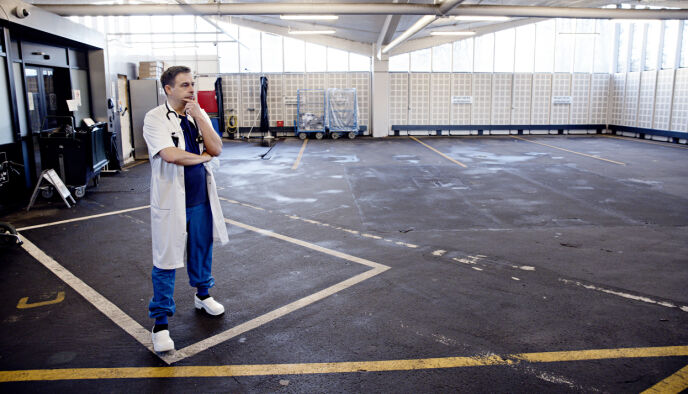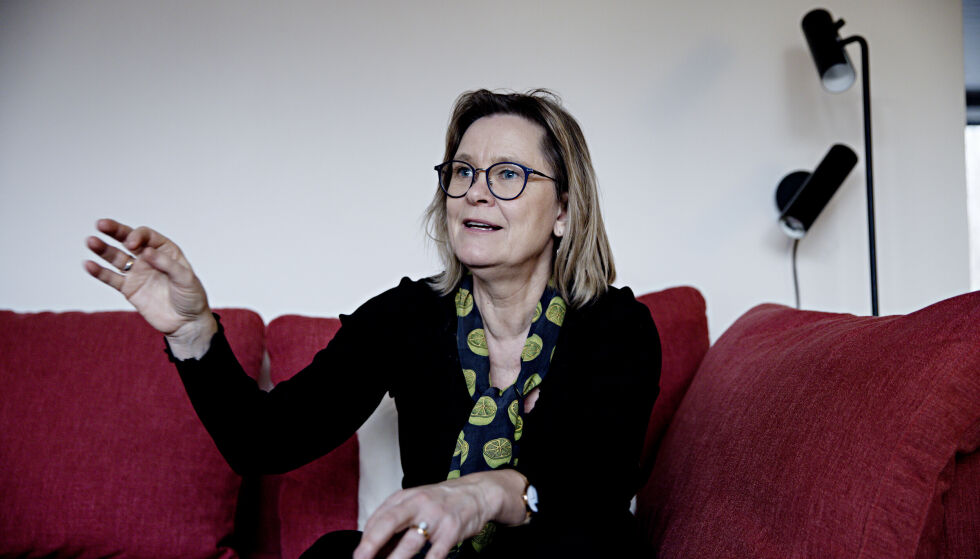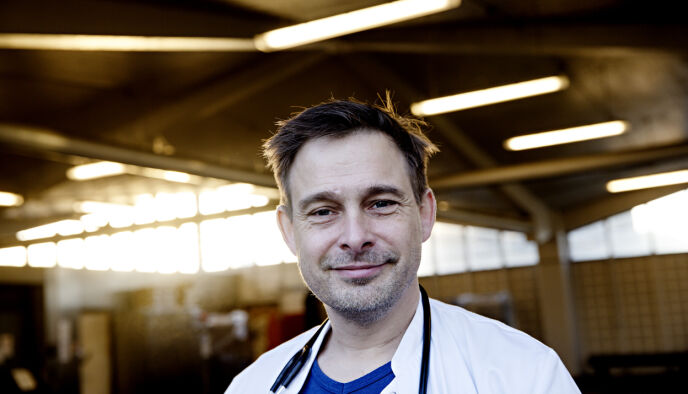HORSENS / KØBENHAVN / VÆRLØSE (Dagbladet): At worst, more than 900 patients with COVID-19 were hospitalized in Denmark last winter. The country is now facing a new and difficult winter.
However, Ulf Horlik, chief medical officer in the emergency department at Horsens Regional Hospital, cares less about whether they have the ability to treat Covid-19 patients this winter.
The biggest problem with corona right now is not the corona itself — there are other consequences: sick leave among employees, deferred elective surgery, and slowly worsening chronic illnesses. The biggest problem arises when we cannot maintain normal operation as I see it.
work requires
Hørlyk receives Dagbladet at her office in Horsens, Denmark. The entrance area is decorated with gold-tone ribbons and some office supplies are wrapped in gift wrap. On one of the gift papers is written: “Every day working with us is a gift.”
Hørlyk thinks it’s like a good party to be with mates. But the task is also difficult. Recently, he saw his co-workers cry at work. grown ups.
– Difficult. He says it is very difficult.
Has it become more difficult during the pandemic?
It is difficult to distinguish between what is due to one and the other. There’s no doubt that the pandemic has made it more difficult, but ironically, we actually had a better time when the hospital was on alert. During the second wave of infections and into May, we actually had fewer patients than usual. But for the past six months, we’ve set a record every month. He wasn’t too busy before.
“I don’t think the spread of the omicron can be stopped, but I do think it can be delayed.”
Troels Liebeck, Division Director at the Serum Statins Institute
omicron
One of the biggest risk factors this winter is the omicron variant. Division Director Trolls Liebeck at the Statens Serum Institute, the sister institute of the National Institute of Public Health in Denmark, has followed closely how the number of omicron cases has doubled each day. The virus variant is not thought to be stopped.
– No, I don’t think the spread of the omicron can be stopped, but I think it can be delayed. The biggest problem is if you get many positive cases at the same time, because you can end up in a situation where the health service is overburdened, Lillebæk tells Dagbladet.
But on the other hand, if you can spread infections over a longer period of time, you will have the opportunity to vaccinate more people and protect vulnerable people in the community.
Lilbeck adds:
– If many are infected at the same time, there is also a risk that many hospital staff and health workers will be sent into isolation, and there must also be someone to take care of those who are admitted to hospitals.
First fall scenario
The division director says it is difficult to predict how the spread of omicron will affect the health service this winter, but he notes that measures have been implemented that hopefully will help delay the spread of infection.
We calculated what would happen if you did absolutely nothing and let the epidemic develop freely. Our models show that you will then have around 500 daily admissions of Covid-19 virus at the end of December. Lilbeck says:
– But this is the “worst” scenario that shows what will happen if you do nothing to prevent it. I think it is very unlikely that we will get there because we are doing so much to prevent such a situation.

Reception: Here the hospital received COVID-19 patients during the second wave. Photo: Christian Rieder Nielsen / Dagbladet
Show more
eligibility
Back at Horsens Regional Hospital, chief medical officer Horlick began with an introduction to emergency medicine. Emergency physicians are people who specialize in receiving patients who need immediate help, he says and marks the flipchart, and the tasks of emergency physicians are to see, evaluate, stabilize, and diagnose.
In Horsens’ emergency department, about 65 percent of patients are complete, according to Horlick. It is estimated that more than 300 COVID-19 patients have been treated in the emergency department during the pandemic. In addition, it is estimated that approximately 300 patients were treated in the pulmonology department, while 42 patients ended up in the intensive care unit.
Hørlyk says it’s quite calm now compared to the second wave. Both because of good vaccine coverage and good contingency plans.
– We now have strong contingency plans, running across the hospital, and have recently revised them. We have very specific plans for what we’ll do if the pulmonology department fills up, and if the intensive care unit fills up. In addition, we are one of five emergency hospitals in the Central Jutland region, where we work well together and can transport patients if necessary, says Hørlyk.
– I don’t think it’s our ICU that has any risks, but the Pulmonary Department. This is due to the admission of all patients who do not need intensive care.
gave the book
He has been the head of the department in it since the beginning of the epidemic, As he describes it in Akutlægens dagbog What I learned about myself while trying to save others.
What made you choose to write a book?
– It was like I had never written a book before. Ha ha ha.
Hørlyk says it all started when they were waiting for the first wave of infections. He tirelessly began writing short stories about individuals who worked as doctors, nurses, and service workers, which he posted on his LinkedIn community. It turns out there was a lot of interest in the stories, he says, and then the publisher called.
I wrote the book to document a time we’ve never experienced before, and to give insight into why I chose to become a doctor and what it’s like to work like this.
Work and family life
In the book, he wrote about balancing work and family life, which Horlick admits can be difficult.
– I see my family very rarely because I work a lot. At the same time, my job is great, I love it, it’s like playing in a drama every day.
Hørlyk says that during the first wave he worked for 13 days in a row. He says he slept in the office and stayed away from infection when he met his family during this time.
– It was a very special experience. Also for the family. Some repair work has been done. It was very difficult.
– But it… it… gave room for reflection: How far should one go to fulfill one’s social responsibilities? If you have a job where you feel you are performing an important task, whether you are a doctor, nurse, policeman, firefighter, or journalist: how far can you go before sacrificing something on the home front? My experience today suggests that one has to be very careful out there.

“The big question is, which one comes first: Omicron or a third dose?”
Lone Simonsen, Professor at Roskilde University
“Game Changer”
Since Denmark reopened the country in September, Professor Lone Simonsen at Roskilde University has believed the country will get through the rest of the pandemic without further lockdown. But then came the omicron variable.
Omikron, the first widespread escape variant, is a game-changer. Therefore, we now have to get a better understanding of the virus variant to understand the threat involved, Simonsen tells Dagbladet, who is also head of the PandemiX Center research center at the university.
– We know that two doses of the vaccine protect something from serious COVID-19, so we know that three doses protect very well. All measures introduced in Denmark will help, in particular the rapid deployment of the third dose. But the question is whether that is enough to limit the spread of infection.
third dose
A third dose will be given to all Danes over the age of 40, equivalent to 3.5 million people, by the new year.
– This will give us better control of the epidemic because the third dose reduces the possibility of infection and the continuation of infection. At the same time, it will make the probability of your acceptance much lower. The big question is, “Which comes first: Omicron or a third dose?”
Simonsen says there is a nursing crisis in Denmark.
So, we have limited capacity in hospitals, even though we don’t really have that many COVID-19 patients compared to other countries. The capacity problem is not only due to the Corona pandemic. Experts are also very concerned about whether we will have a demanding flu season in addition to the Corona pandemic, which will lead to more hospitalizations.

As a good party: Hørlyk says that working with colleagues at the hospital can be a good party. Photo: Christian Rieder Nielsen / Dagbladet
Show more
You worry me all the time
Hørlyk at Horsens Regional Hospital also mentioned a shortage of nurses, but says they can still handle it.
– I worry all the time that the doctors and nurses will get tired – because they will run out and can’t take it anymore. Hørlyk says they are badly whipped, and Dagbladet reminded them that his colleagues wrote “Every working day with us is a gift” in his office.
– Yes, it is mysterious. Ha ha ha. It is mysterious. They are a wonderful group. When we’re here together, it can almost be like a good party. I work with some amazing people. You can hardly feel when you come home after work because it’s so intense and demanding. But when you get back to work again, the party starts again.
The problem is that we also have to have energy left for our wives, husbands, and children. So it comes down to how to balance that.
How well have you been able to balance work and private life today?
– It’s better now, but it’s hard. My wife and I talk about how difficult it is to make ends meet. But I have an incredibly cute wife, and it’s a miracle that we’re still together after 25 years. You must be the most patient person in the world.


